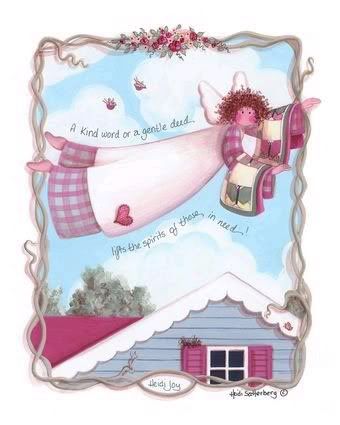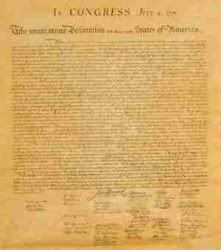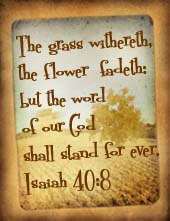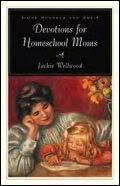CREAM OF SPINACH SOUP
Saute in water untill tender:
*1 1/2...........Onions, chopped
*4-5 cloves......Garlic, crushed
Add:
*4-5.............Potatos, large peeled, & cubed
*12 C............Water
Cook until potatos are done, then add:
*2-3 bundles.....Fresh spinach, chopped (frozen works too)
Continue to cook until spinach is tender, then add:
*3Tb.............Chicken Style Seasoning
*Salt to taste
*3Tb.............Olive oil (optional)
~Blend soup in blender and pour into another pot.
~Heat and serve.
Makes 16 1cup servings
Recipe provided by: The Guilt Free Gourmet
Vicki B. Griffin, PhD, MACN
Gina M. Griffin
____________________________________________________
Our family loves this soup! Even the kids. If you or anyone in your family doesn't like spinach this is a great way to get it in your diet. I don't care for spinach myself, raw or cooked. But I love this!
Thursday, July 26, 2007
A Family Favorite
Wednesday, July 11, 2007
Morning Devotion

This was my morning devotional this morning. I felt like sharing it with you. It meant a lot to me. Hope it does for you too.
True Christian Culture
But God, who is rich in mercy, for his great love wherewith he loved us, even when we were dead in sins, hath quickened us together with Christ, . . . and hath raised us up together, and made us sit together in heavenly places in Christ Jesus. Eph. 2:4-6.
If you come into close relationship to Jesus Christ you see wondrous things out of His law that are not now seen. The softening, subduing influence of the Spirit of God upon human hearts and minds will make the true children of God to sit together in heavenly places in Christ Jesus. Christian culture will be carried on in every heart worked by the Holy Spirit. There will be a soft, subdued spirit in all those who are looking unto Jesus. The love of Jesus always leads to Christian courtesy, refinement of language, and purity of expression that testify the company we are with--that like Enoch we are walking with God. There is no storming, no harshness, but a sweet fragrance in speech and in spirit.
The Word is to be our study. Here is a mine of precious ore. Much of it has been glimpsed at, but there is the digging to be done to secure much more precious treasures. There have been many who have just rummaged over the surface in a most careless, slovenly manner, when others are searching more carefully and prayerfully and perseveringly, and hidden, inestimable treasures are found. . . .
Let it be seen that your life is hid with Christ in God. Let there be no hasty speech, no cheap words, no slang phrases. Let it be demonstrated that you are conscious of a Companion whom you honor, and that you will not make Him ashamed of you. Only think, we are representatives of Jesus Christ! Then represent His character in words, in deportment. . . . The converting power of God is needed every day to sanctify and fit vessels for the Master's use. O there are precious lessons in the Holy Book that we are yet to find and practice! Our conscience must recognize and revere a higher standard of Christianity . . . . You may be all light in the Lord. You may be increasing in efficiency, in purity, in the knowledge of God, if you keep meek and lowly of heart.
That I May Know Him
~White
Saturday, July 7, 2007
The Two Gardens

“Arthur, will you lend me your knife to sharpen my pencil?” asked Mary Green of her brother, who was sitting at the opposite side of the table.
Arthur drew the knife from his pocket, and pushed it rudely toward her, saying, at the same time: “Now don’t cut your fingers off.”
The knife fell to the floor and Mary had trouble finding it, but her brother made no offer of assistance. He seemed engrossed in his geography lesson. At length he closed his books, exclaiming: “Well, I’m glad that lesson is learned.”
“Now will you please show me how to do this example before you begin to study again?” asked Mary. She had been puzzling over a question in subtraction.
“You are big enough to do your homework, I should think,” was the answer. “Let me see. What, this simple question? You must be stupid if you cannot do that. However, I suppose I must help you. Give me the pencil.”
The problem was soon explained to Mary’s satisfaction. Several hints given her as to those which followed prevented further difficulty. Arthur did not mean to be unkind to his sister; he loved to help her, though his manner seemed harsh and cross. Presently father sat down at the table where the children were studying.
“You are impolite, my son,” he said.
“I cannot always think about manners,” replied Arthur, rather rudely.
“Yet they are of great consequence, Arthur. A person whose intentions are really good, and who desires to be of use to his fellow beings, will hurt his chances of usefulness by unkind manners.”
“If we do what is right, father, I shouldn’t think it matters how we do it.”
“You are mistaken, Arthur. It makes a great deal of difference. This morning I visited a poor woman in the neighborhood. I couldn’t help her much, but for the little that I gave her she appeared deeply grateful. Finding that she had formerly been employed as a laundress by a man whose office is near mine, I asked why she did not apply to him for help. The tears came into her eyes as she replied: ‘Indeed, sir, I know he is very kind, and he has helped me before when things went hard; but he has such a harsh way of speaking. A penny with kindness is worth a dollar from those who hurt our hearts.
“Now, my son, I know this man to be a man of principle, but he has acquired a harsh, repulsive manner, which hides his good qualities. When you were helping your sister this evening you were unkind.” “But I did not feel unkind, father. Are not our feelings of more consequence than our manners?”
“Both are important, Arthur. It seems to me that kind feelings should produce kind manners.”
Arthur thought but little more of what his father had said. He did not improve his manners, and his playfellows said of him: “Arthur Green is a goodhearted boy, but so rude and cross in his manners. One would suppose he is angry even when he is doing a favor.”
Mr. Green had recently moved his family to a country home. Both Arthur and Mary liked the fresh air and the green fields. They asked their father to give them each a piece of ground for a garden and to show them how to prepare it for planting. This he agreed to do. Arthur did the most difficult work, but Mary was always ready to help. The brother and sister were fond of flowers, and looked forward to the time when they would be able to gather armfuls from their own garden. Their father gave them seeds and plants, and he helped them in the planting. Before many days little green leaves began to peep above the ground, and as the season advanced all the plants seemed to flourish.
“The seeds father gave me must have been different from those he gave you,” said Arthur to his sister, as they were weeding their gardens one day.
“I suppose he thought we would not want to have the same kinds of flowers,” replied Mary.
“No, of course not,” agreed Arthur; “but I don’t like the looks to my plants as well as I do yours. The leaves are coarser, and the buds don’t look as if they would make pretty flowers.”
Arthur grew more and more dissatisfied as Mary’s plants were covered with beautiful blossoms, while his own had either no flowers at all, or were pale and small. Having had no experience in gardening, he could not imagine the reason and complained to his father.
“I am sorry that you are not satisfied with your garden, my son,” was the reply. “The seeds that I gave you were the seeds of vegetables. When I last looked at them, they seemed to be growing fine.” “Vegetables, father!” exclaimed Arthur. “I wanted flowers. I didn’t want to have a vegetable garden.”
“I didn’t suppose you would care for flowers, Arthur. Of what use are they?”
“They may not be of much use, father; but they are beautiful. We like to look at them and to have them to give to our friends. Are not things useful which give pleasure?”
“I think so my son, but you seemed to have a different opinion. In preparing your garden, I avoided giving you those plants which posses beauty, even as you avoid cultivating what is beautiful and pleasing in your manners.”
Arthur was silent. He was struck with the truth of his father’s words. At length he said: “Well father, I will take good care of my vegetable garden this year. Every time I visit it I’ll think of what you said. When you see better words and manners in me will you give me a garden that is beautiful as well as useful?”
“I will, son.”
When another summer came, there had been a change in Arthur. The real kindness of his heart shone forth in his agreeable manners toward all around him. Flowers were blooming in his garden, and his father said: “These represent kindness and love.”
Tuesday, July 3, 2007
Independance Day

History of the 4th of July
“Thus may the 4th of July, that glorious and ever memorable day, be celebrated through America, by the sons of freedom, from age to age till time shall be no more. Amen and Amen.”
Virginia Gazette on July 18th, 1777
Schoolchildren in America learn the basic history of the events surrounding the Fourth of July, but the details of this monumental occasion in American history somehow fall through the cracks.
Although July 4th is celebrated as America’s official split from Britain’s rule and the beginning of the American Revolution, the actual series of events show that the process took far longer than a single day.
Taxation without representation! That was the battle cry of the 13 colonies in America who were forced to pay taxes to England’s King George III with no representation in Parliament. As dissatisfaction grew, British troops were sent in to quell any signs of rebellion, and repeated attempts by the colonists to resolve the crisis without war proved fruitless.
The original resolution was introduced by Richard Henry Lee of Virginia on June 7, 1776, and called for the Continental Congress to declare the United States free from British rule.
On June 11, 1776, the colonies’ Second Continental Congress, meeting in Philadelphia, formed a committee with the express purpose of drafting a document that would formally sever their ties with Great Britain. The committee included Thomas Jefferson, Benjamin Franklin, John Adams, Roger Sherman and Robert R. Livingston. The document was crafted by Jefferson, who was considered the strongest and most eloquent writer (nevertheless, a total of 86 changes were made to his draft!) The final version, the document that we know as the Declaration of Independence was officially adopted by the Continental Congress on July 4, although the resolution that led to the writing of the Declaration was actually approved two days earlier.
The following day, copies of the Declaration of Independence were distributed and, on July 6, The Pennsylvania Evening Post became the first newspaper to print the extraordinary document.
On July 8, 1776, the first public readings of the Declaration were held in Philadelphia’s Independence Square to the ringing of bells and band music.
All of this had occurred with some of the delegates to the Congress not even present; New York, for example, did not even vote on the resolution until July 9th. (Did you know that that not a single signature was appended to the Declaration on July 4th. While most of the fifty-six names were in place by early August, one signer, Thomas McKean, did not actually sign the Declaration until 1781.)
One year later, on July 4, 1777, Philadelphia marked Independence Day by adjourning Congress and celebrating with bonfires, bells and fireworks.
The custom eventually spread to other towns both large and small, where the day was marked with processions, oratory, picnics, contests, games, military displays and fireworks. Observations throughout the nation became even more common at the end of the War of 1812 with Great Britain.
On June 24, 1826, Thomas Jefferson sent a letter to Roger C. Weightman, declining an invitation to come to Washington, D.C., to help celebrate the 50th anniversary of the Declaration of Independence. It was the last letter, Jefferson, who was gravely ill, ever wrote. In it, Jefferson says of the document:
May it be to the world, what I believe it will be ... the signal of arousing men to burst the chains ... and to assume the blessings and security of self-government. That form, which we have substituted, restores the free right to the unbounded exercise of reason and freedom of opinion. All eyes are opened, or opening, to the rights of man. ... For ourselves, let the annual return of this day forever refresh our recollections of these rights, and an undiminished devotion to them.
In 1941, Congress declared July 4 a legal Federal holiday. Today, communities across the nation mark this major midsummer holiday with parades, fireworks, picnics and the playing of the "Star Spangled Banner" and marches by John Philip Sousa.
Monday, July 2, 2007
This or That

Fruit/Veggie: Fruit
Night/Day: Day
Sour/Sweet: Sweet
City/Country: Country
Right/Left Handed: Right
Pancakes/French Toast: French Toast
Short hair/Long: Long
Candy/Flowers: Both
Snow/Rain: Snow
Scuba Dive/Sky Dive: Sky Dive
Play Instrument/Sing: Both (I don't play an instrument but I'd like to)
ipod/CD player: ipod
Taco Bell/Subway: Subway
Granny Smith/Red Delicious: Granny Smith
Magazine/Newspaper: Magazine
Board Games/Computer games: Board Games
TV/Computer: Computer
Hotel/Camper: Camper
Putt Putt/Bowling: Putt Putt
Public School/Homeschool: Homeschool
Drive/Ride: Drive
West Coast/East Coast: Not Sure
Skirt/Dress: Skirt





















